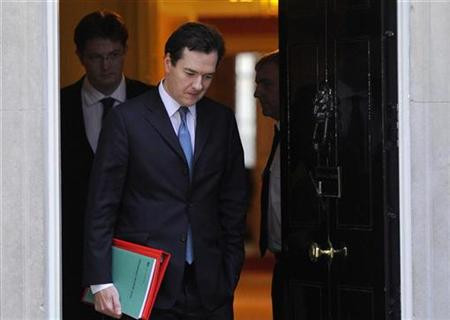Comprehensive Spending Review reaction: Unions wail, business pleased, economists mixed

The Coalition government's Comprehensive Spending Review, announced yesterday by the Chancellor of the Exchequer, George Osborne, has drawn a mixed reaction from business, unions and economists.
Unions have expressed predictable rage at cuts to the public sector, business groups have broadly welcomed the cuts while economists have been somewhat mixed in their response.
Derek Simpson, Joint General Secretary of Unite, said, "This is not a spending review - it's a massacre. It's totally perverse to claim that cutting half a million jobs and razing our public services to the ground is good for this country. No matter how often it repeats that its actions are fair, this government is making a political choice to attack the public sector and, by doing this now damaging the whole of the economy long into the future.
"There is no evidence that public sector workers who lose their jobs will find alternative work in the private sector. In fact these cuts will destroy nearly as many private sector jobs as public sector ones."
Fellow trade unionist Brendan Barber, General Secretary of the Trades Union Congress, wailed, "Right across government the Chancellor has announced eye-watering cuts that will have a desperate impact on communities, business and hard-pressed families. But he has not had the guts to spell out the detail, and instead tried to talk up a few crumbs of good news.
"Worst of all, to score a cheap party political point about Labour spending plans, he has loaded cuts on to benefits and welfare payments. Those who have not had a minister fighting their corner but who are most vulnerable to cuts have lost the most today. The poorest have become the victims of a political jape.
"But the biggest tragedy of all is that the spending review is likely to fail on its own terms. These cuts will depress the economy by causing a million job losses and undermining business and consumer confidence. There will be plenty of pain, but little to gain."
Business leaders were more upbeat, although they were far from ecstatic in their praise.
David Frost, Director General of the British Chambers of Commerce, said, "Business has been clear: the deficit must be tackled, no matter what. The spending review does the job of setting out how this will be done.
"Overall, the Spending Review could have been worse for business. While we were disappointed that the Government succumbed to political ring-fencing of some spending areas, cuts to productive infrastructure investment were not as bad as many had feared.
"Now that the Spending Review is complete, our message to Government is that it is now time for a clear strategy for growth - which in turn will give companies, and especially small and medium-sized enterprises, the confidence to invest. Perceptions matter. Businesses and government must work together to deliver a real year for growth in 2011. This is the only way that the private sector will be able to take up the slack."
Meanwhile Richard Lambert, Director General of the Confederation of British Industry, commented, "The Chancellor has got the strategic direction of this spending review right. He has stayed the course outlined in the June Budget, with economic growth a top priority.
"We particularly welcome the extra £2bn a year on capital spending, and the focus on areas that support growth. These include transport and other infrastructure, education and science, and the low-carbon economy.
"The spending cuts, though painful, are essential to balance the UK's books and build its future prosperity.
"Now the Government must deliver its promised savings by re-engineering public services."
Economists were rather more mixed however, with David Branchflower, former member of the Bank of England's Monetary Policy Committee, opposing the CSR.
Speaking at the Citywire Wealth Manager Retreat, Branchflower said, "Implementing an austerity package on the scale and at the speed proposed by the coalition has the potential to be the greatest macroeconomic mistake for a century. The economy is slowing, which suggests that implementing draconian cuts at this point in the cycle will be dangerous and likely provoke widespread dissent."
However Howard Archer, Chief Economist at IH Global Insight, was more nuanced, saying, "The major spending cuts will undeniably weigh down on economic growth and there are serious concerns that it could derail an already fragile UK economic recovery. This is a risk that the coalition government clearly believes is worth taking, as they argue that the longer-term risks to the economy of not taking strong corrective fiscal action are even greater. In particular, the government has highlighted the drain imposed on the economy coming from the higher interest payments that come from higher government debt levels, stressing that this is a major waste of taxpayers' money. There is also the danger that investors' confidence in the UK economy will be undermined if we lose our AAA rating.
"Perfectly reasonable cases can be made for both pressing ahead with the spending cuts at the current rate, and lowering them down as is evident by the intense debate that continues to rage among politicians, economists and other analysts. If there was an obvious answer, there would not be such a rigorous, ongoing debate.
"Only time will tell who is right. And much could yet depend on the general state of the global economy over the next couple of years. The better this is, the more chance that the UK recovery can survive the fiscal pain intact. However, if the global economy suffers serious problems over the next couple of years, then the UK economy could struggle terribly.
"We do not expect the spending cuts to push the UK into a "double dip" recession. But we do expect growth to be muted for an extended period (although this reflects other factors in addition to the spending cuts - such as high consumer debt levels, ongoing tight credit conditions, sluggish global growth)."
© Copyright IBTimes 2025. All rights reserved.





















